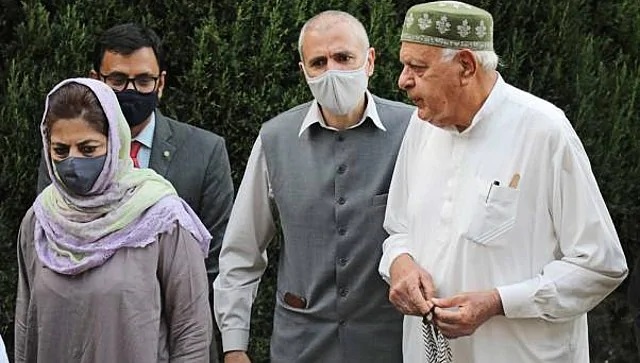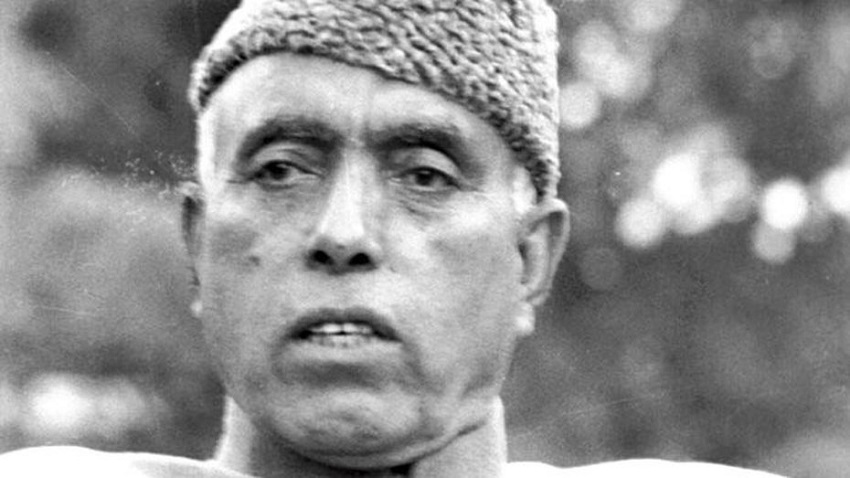
The angst expressed by the originators of Gupkar Declaration I and II need to thin out and become perceptional. Leaders long in seats of power tend to become an institution by default for good or mundane reasons. The Gupkar Gang, as their detractors would like to call them, belong to that specie of humanity.
Reconsidering the blunder of boycotting panchayat elections previously, the opposition parties have changed the course of their approach to the ongoing political scenario in Kashmir. This we presume is a healthy sign because what can be achieved through the normal democratic process cannot be achieved through unleashing of violence.
We consider it a good move by the Gupkar Alliance to jump into the mainstream and strengthen the democratic process. This also means that the militants will be forced to re-assess their line of action and come to the table for talks.
We consider it a healthy sign for the Indian democracy and especially for Kashmir where democracy and secularism have received a strong setback owing to militancy. Participation in the DDC elections would pave the way for further political interaction in the Union Territory and possibly the chances may open up for the restoration of the historical State of Jammu and Kashmir. Though one cannot predict whether the special status will be restored, nevertheless, the state will certainly work in a much improved political environment. It is likely to reduce corruption that has so venomously crept into the vitals of society.
When will the State be restored its previous status is not easy to predict but one thing is clear that the administration, development, law and order situation and security dimensions will get a new facelift. In particular, tourism will attain new dimensions if we consider the plans and programmes of the government.
However, the incumbent civilian government in the restored State will have to cut its cloth according to its size. Delivery will be the key and final proof of its performance. The days of dynastic and arbitrary rule are gone forever and can never return. Those used to the general look of the State Exchequer will find their perfidy coming to nought.
If these ideals are what the Gupkar Alliance intends to pursue, its policy will certainly receive accolades. But the question is will the elected civilian government have the courage to take on the militants and their threats and intimidation? Though of course, the security forces will cow them down everywhere and every time. The local leadership has a great responsibility of steering the ship of the state through disturbed waters. Fortunately for them, the central government is forthcoming with funds and plans that bring about a revolution in the economic life of the state.
The element of self-abnegation, expected of politicos seldom gets back benched. Ultimately, the connection between them and the demos they represent shrinks to a small coterie whose members tend to turn aggressive, worshippers of personality cult and finally goons and cronies with invidious influence the power structure.
Kashmir Valley leaders are usually obsessed with local partisan politics and a narrow prism to look at the far-reaching consequences of being an entity of the world’s largest secular democracy. How amusing that Kashmir’s most popular leader Sheikh Muhammad Abdullah understood the benefits of a secular democracy for a region in which the Muslims formed as big a minority as to pass for almost an overwhelming group in the sense of adult franchise arrangement. But on the other hand, he erroneously concluded that his popularity, power knob and ego would remain secured and intact only if he pandered guardedly to premier community support in narrow parameters. It meant that he was trying to have the best of both the worlds without making conspicuous sacrifices for the advantages he was seeking. The undisclosed agenda of 1952 Nehru-Sheikh Accord became the catalyst to the sordid narrative of August 1953.

Thereafter, the gradual downslide of state-centre relations emerged as a new gamut on J&K political platform. In the beginning, Kashmir Valley masses did not make out the real cause of the Sheikh’s simmering estrangement with New Delhi in the early 1950s although sporadic incidents of limited civilian dissatisfaction could be felt. Bakhshi Ghulam Muhammad, who succeeded the Sheikh in 1953 AD, entreated himself to the masses of people in the valley and could also handle New Delhi with requisite dexterity. He proved himself to be the man of the masses and his unforgettable contribution towards the development of J&K, subscribing to nationalist politics and abiding secularist ideology.
But alas! The Kamaraj-ing of Bakhshi proved such a Himalayan blunder as makes Kashmir bleed ever since. The truth is that India lost Kashmir the day when the Bakhshi was removed more by caprice than by essential political pragmatism and statesmanship.
A big fissure developed in the state-centre relationship. No chief minister, thereafter, nor even Ghulam Muhammad Sadiq, could restore the crucial and expanded link because he posed as an icon of the Leftists bereft of the quality of mass leadership which was the domain of his predecessor. With Leftists playing the very unimpressive class and sectarian role in the country, they influenced Nehru who ousted some more popular contemporary regional leaders in whom he saw the potential of upstaging their popularity. Bakhshi was trapped.
Second stint of the Sheikh (1975-82), contrived through gross manipulation of democratic procedure was a different story. His fake secularism had vanished altogether; he got bogged with international Islamic politics; he established liaison with the Saudis through Pakistani conduits and brushed aside local issues essentially of development, of streamlining relations with New Delhi and of reforming the ideological assault led by Jamaat-e-Islami of Kashmir. He could not control the aggressive rather militant cadres of Plebiscite Front from indulging in hooliganism and public disorder just because in his physical absence from the scene owing to incarceration, his bigoted lieutenant Mirza Afzal Baig left no stone unturned to cement the link between Jamaat-e-Islami and the Plebiscite Front essentially based in Pulwama district of South Kashmir and Sopor town in North Kashmir at whose hinterland borders touched PoK via Kupwara.
After the Sheikh’s demise in 1982, the National Conference remained the premier mainstream political party in Kashmir with Farooq Abdullah, the second son of Sheikh at the driver’s seat. I will not go into the details of the sordid role of Farooq and his party in deliberately overlooking or underestimating the dangers of parochial politics in a sensitive border state torn by internal conflicts or political myopia and looming external threats. Although Farooq did not overtly socialize with the Jamaat-e-Islami of Kashmir, yet he knew them and declined to cut them to their size. To alley their misconception about him, he regularized thousands of darsgahs meaning exclusive Jamaat seminaries and absorbed thousands of their teachers into government school education department without realizing how effective they would be in polarizing Kashmiri society vertically and subverting the social fabric and administrative functionality. Most of the bureaucrats who rose to senior administrative positions were in one way or the other the products of these seminaries that had done successful brainwashing experiments on them.
The situation became alarming for Farooq and his party when the political wing of the Jamaat-e-Islami known as Muslim United Front (MUF) actively participated in the assembly elections in 1986 and stunned the National Conference by leading in some constituencies in Srinagar especially the Magarmal Bagh. How National Conference goons under instructions from party echelons misbehaved and manhandled the winning MUF candidates and intimidated the returning officers as well, was attributed by the politically conscious Kashmiri Muslim voters as the underhand game of New Delhi in which it showed reluctance to popularize Kashmir’s political play game. This was the alienation point for them which did not look back any more. Therefore, after the MUF episode, Kashmir politics went through a sea change. ISI of Pakistan had won the first round. Farooq became fully conscious that his political survival had to be more reliant on support from the local influential Jammat rather than New Delhi.
It was sheer political shortsightedness of New Delhi (Congress) to have allowed the critical situation in Kashmir drift to a dangerous course. But Congress had from very early days of Kashmir’s accession to India begun to feel that its interests were safe in the Kashmir proxy (the Sheikh dynasty). That ultimately proved the fundamental cause of exasperation for the valley-based populace and continues till date.
The dynastic rule in Kashmir focused on its primary objective of retaining power and self-aggrandizement and the camp followers leaving no stone unturned to promote its narrow-minded objective by means fair or foul. The bureaucracy understood how much Kashmir politics got personalized, spread out their fangs and hence the general loot in which the politicians, ministers and other beneficiaries flourished day and night. Their arrogance rose to the level that they refused submitting utilization certificates for the huge funds sanctioned by the centre under various central schemes and there was no action for dereliction of duty. Highly controversial laws that sullied rights and interests of the general public were enacted like the ‘Roshni Act’ which benefitted a small group of feudal lords but ignored the rights of the common man. Corruption became much more rampant during the tenure of Farooq’s son. That is what usually happens under the dynastic rule!
